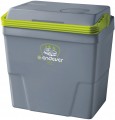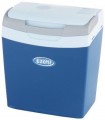Operation mode
—
Cooling. A mode of operation in which the food placed inside is cooled to a temperature just above zero (the minimum threshold is usually around 4 °C). Present in all car refrigerators by definition.
—
Freeze. An operating mode designed to cool the food placed in the cooking chamber to a temperature below zero (in some models down to -18°C). In some models, it can also be used for making ice in special compartments.
—
Heating. The mode of operation for heating products is especially useful in the cold season. Many models with this function have fairly good heating characteristics, allowing you to heat food in them to a hot state. This mode is also good for keeping food hot. However, car refrigerators with a heating function are usually quite expensive.
Max. cooling at
This parameter determines how many degrees the refrigerator is able to cool the product loaded into it relative to the ambient temperature. Let's say the maximum cooling for a particular refrigerator model is 20°C; at an air temperature of +30°C, a product with the same temperature is loaded into it. Thus, the final temperature of the product will be 30 – 20 = +10 °C. In addition, it should be noted that the final temperature cannot be lower than the minimum cooling temperature (see Minimum cooling temperature)
Min. cooling temperature
The minimum temperature to which the refrigerator is able to cool the product placed in it when operating in cooling mode. It should be taken into account that the minimum cooling temperature is not always achievable in fact: the actual cooling temperature depends on the ambient temperature and on the capacity of the refrigerator for maximum cooling (for more details on the calculation formula, see "Maximum cooling per (°C)"). However, this applies only to refrigerators that are not equipped with compressors (see Compressor);
compressor models are able to reach the minimum cooling temperature regardless of external conditions.
Сooling energy consumption
The power consumed by the refrigerator when operating in cooling mode. The greater this power, the more performant the refrigerator is, usually, and the less time it takes to cool the product. On the other hand, note that more power means more power consumption — which can be critical, for example, during long-term operation from a car battery (that is, when the car engine is turned off).
Heating energy consumption
The power consumed by the refrigerator when operating in heating mode. As with cooling, more power usually means more performance; see "'Сooling energy consumption" for details.

